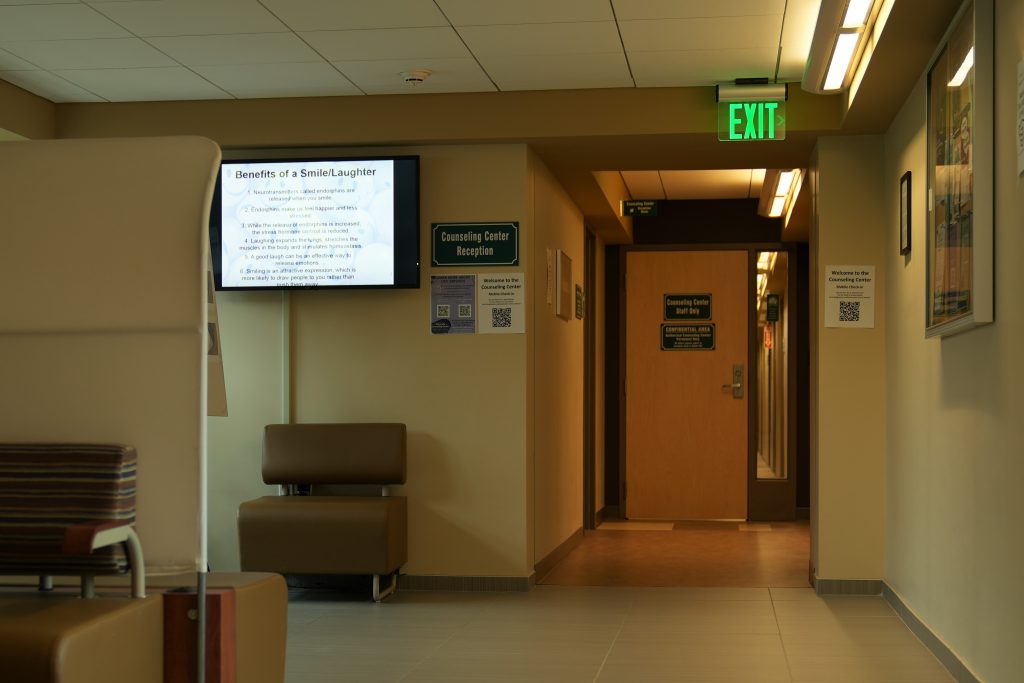
Students have had varying experiences with Binghamton University’s counseling services.
At BU, the student to counselor ratio based on the fall 2021 student population is 1,128-to-1, with 16 counselors at the University Counseling Center (UCC) for 18,055 students. Due to the limited number of counselors available, the UCC uses “brief therapy,” in which students receive a limited number of sessions before being referred to outside resources.
“In order to meet significant student demand for service and use resources most effectively, the UCC utilizes a brief therapy model,” the UCC website reads. “Brief therapy is short-term and focused on helping students to resolve or effectively manage a specific problem or challenge, or to make a particular desired change. The therapy is typically solution-oriented, and sessions are geared toward direct and active intervention to help clients achieve specific goals. The frequency of sessions may be weekly at first, but more often are every other week.”
Students have expressed mixed feelings about the UCC. One anonymous student who used the UCC’s mental health services said that they had a positive experience.
“I’ve been to and still currently attend [UCC] sessions,” the student wrote. “I was definitely apprehensive of going at first just because I’d heard that college therapy generally isn’t that helpful. However, I’ve actually had a pretty good experience and I’ve found that my sessions have helped quite a bit. I’ve felt welcomed the entire time by both the office staff and my therapist.”
Other students feel that the goal of counseling sessions is misguided. Alyssa Harris, a freshman majoring in environmental studies, said her experience was more focused on academics.
“I have sought out mental health services here at BU,” Harris wrote. “My experience was that they were more focused on my academics than the mental health conditions I reached out about.”
According to the UCC website, the UCC’s goal is to allow students to thrive in a university setting.
“The [UCC] is committed to promoting student psychological well-being so that students may fully and effectively engage in all the opportunities available at the University,” the UCC website reads. “The UCC provides assessment, counseling, referrals and related services to students in their pursuit of personal and academic growth, including the strengthening of their emotional, intellectual, behavioral, cultural and spiritual development.”
Besides the UCC, there are other mental health resources available to students. Support, Empathy, Empowerment, Kindness (SEEK) is a mental health helpline that is run by and meant to serve BU students. Hannah Roth, the president of SEEK and a junior majoring in integrative neuroscience, said SEEK is a valuable resource for BU students.
“I think SEEK is a unique resource because students are able to speak with a trained peer, creating a different setting than that of typical mental health resources,” Roth wrote in an email. “We offer a safe space for students to speak with other trained call-handlers who offer a listening, nonjudgmental ear for those who are seeking someone to speak to about a range of topics. SEEK also is very passionate about mental health advocacy.”
Other campaigns have also emerged from BU students and alumni. One such campaign is No Man Sits Alone, which builds and sells folding Adirondack chairs and donates a percentage of each sale to a mental health nonprofit. In the wake of the passing of Robert Martin, a BU lacrosse player and graduate student, this initiative gained the support of the lacrosse team.
Roth said professors at BU have taken different approaches to serving students’ mental health needs, and expressed her hope for resources to improve.
“This semester, [BU] mourned the tragic loss of the lacrosse player, Robert Martin,” Roth wrote. “Once returning to class the next week I had a professor make an announcement in class about reaching out and display multiple mental health resources available on the screen in [the] lecture hall. On the contrary, I have heard about professors who have dismissed students struggling with mental health issues, losses and serious crises. Going forward, I believe that change is required for mental health resources on campus so that they are more available to students who need help. If students are struggling and taking the time to reach out, they shouldn’t have to face additional barriers.”
Editor’s note (5/10/22): An earlier version of this article included a student-to-counselor ratio recommended by the American School Counselor Association (ASCA), and incorrectly compared it with college data. The ASCA recommendation and national data cited in the article was regarding K-12 counselor ratios. Pipe Dream deeply regrets the error.


